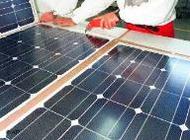Angela Merkel wants Europe to lead in the War Against Oil.
UPDATE: Merkel has succeeded in getting hard targets for renewables at an EU summit.
The German Prime Minister is pushing this stance while leading a conservative coalition. Perhaps because she was born in East Germany and grew up there she knows the cost of environmental failure.
The so-called European Presidency rotates among the countries involved, as does the chairmanship of the G8. Merkel currently has both positions. It is a unique political moment, one which can be seized on behalf of (at most) one issue.
Merkel has chosen energy. She is pushing the 27-member EU toward mandatory curbs on greenhouse gas emissions, a modest cut of just 20% by 2020. She is getting enormous pushback, especially from France, which doesn’t understand why nuclear power isn’t green.
"It’s not five minutes to midnight, it’s five minutes after midnight." That’s a good quote. Merkel gave it to a German TV network before an Energy Summit meant to address the problem.
I love what she’s doing, but I have a modest suggestion.
Don’t call it a problem. Call if an opportunity. (Picture from Deutsche Welle.)
That’s what it is, really. A mandatory set of targets, supported by a high and rising price floor for carbon-based energy, is the kind of incentive that can jump-start a lot of businesses. Germany is already going through a solar boom — this will extend it throughout the EU. It will also lead to research that can dramatically increase the yield of solar panels, causing their replacement, meaning another boom.
Wind turbines, sea turbines, insulation, and solar power entrepreneurs all need the assurance of a market if they’re to get the capital they need to proceed. That’s the real bottom line here.
This is the lesson of the 1980s in the U.S. Falling oil prices killed off the U.S. environmental industry. It’s still prostrate. A European business environment that encourages these industries will grow them, and that growth will create technology that can be exported, that can make money.
In other words, she just needs to combine her themes. She talks about good jobs, but those don’t just come from well-trained workers. They come from private industry, which needs market incentives. A policy that guarantees green energy companies a market is going to lead to more good jobs, in research, in manufacturing, and in services.
This is the real "good situation" Europe finds itself in. Merkel should be pressing her case for green energy on that basis. It’s not about controls, it’s about incentives. It’s not about limits, it’s about opportunities.












Xalatan.
Preservative-free xalatan. Xalatan.